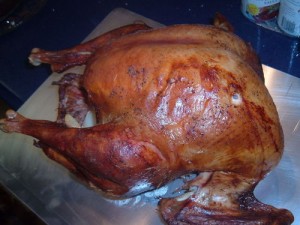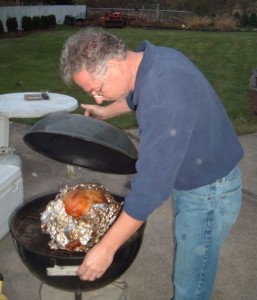Do Jewish People Celebrate Thanksgiving and Can Jews Celebrate Thanksgiving?
Thanksgiving is largely an American and Canadian holiday, though today more people in various countries around the world are celebrating it. Thanksgiving in the United States is celebrated on the fourth Thursday of November and in Canada it is celebrated on the second Monday of October. On Thanksgiving many families get together for a dinner which is often comprised of Turkey, stuffing, and cranberry sauce.
If you are Jewish and invited to a Thanksgiving dinner or want to host one is there any halachic issue (issue in Jewish law)?
 The concept of a thanksgiving holiday/festival appears in almost every culture. A celebration is held at the beginning or the end of the harvest season to give thanks. As Jews we celebrate this with the festival of Shavuot, which is also known as ‘Chag Habikurm’ because the first fruits harvested were brought to the temple as a gift. Chag Hakatzir is another name for Shavout which alludes to celebrating the first harvest of grain.
The concept of a thanksgiving holiday/festival appears in almost every culture. A celebration is held at the beginning or the end of the harvest season to give thanks. As Jews we celebrate this with the festival of Shavuot, which is also known as ‘Chag Habikurm’ because the first fruits harvested were brought to the temple as a gift. Chag Hakatzir is another name for Shavout which alludes to celebrating the first harvest of grain.
In some indigenous cultures they will celebrate at the end of the harvest season and give thanks to their idols and pagan deities. Such a thanksgiving celebration a Jew should not attend. However the thanksgiving instituted in North America is about giving thanks to G-d for a good harvest and thus there would be nothing wrong for a Jew to take part off course provided the meal was kosher.
Is turkey kosher? Read more HERE!
2 Responses to “Do Jewish People Celebrate Thanksgiving and Can Jews Celebrate Thanksgiving?”






Hello Dear , Who is RABBI BEN ? I know there is a psak from Rav Moshe Feinstein Zt”l (The Posek hador in that time in USA !) who strictly forbided to celebrate this even ! see sefer ” IGROT MOSHE ” cheelot ve techuvot ! only a posek can cancelled his decret-psak !
awaiting your reply, thanks
Thank you for raising this issue.
There are a number of responses written by Rabbi Feinstein; His general outlook was that Thanksgiving is not a religious holiday and therefore there is not a problem to acknowledge it. Even eating Turkey seems to be okay by Rabbi Feinstein because there is no religious law around eating turkey. Rabbi Feinstein would prohibit a thanksgiving meal if it were celebrated with ritual like; reading a thanksgiving prayer or poem, basically making it into a ceremony. This is in accordance with Shulchon Aruch that states: it is prohibited to celebrate a holiday even if it is completely secular but you are celebrating it with a gentile who is worshipping it as a religious holiday.
There are other Rabbis who as well permit eating turkey on thanksgiving because it is no way recognized as an idolatrous holiday.
Further: even if some people do celebrate thanksgiving as a religious holiday by going to church, to the vast majority it remains a secular holiday. The same would apply to celebrating a countries independence day like the fourth of July. Some may turn it into a religious holiday by giving thanks, but to the majority it remains secular.
I like what Rabbi David Cohen (of Gvul Yavetz), who writes:
“The celebrating of Thanksgiving is something that has been disputed by many rabbis — some prohibited and maintain that it is a derivative prohibition of idol worship and there are others who completely permit [its celebration]. In my opinion, to eat turkey for the sake of a holiday is prohibited by the rule of Tosafot, Avodah Zara 11a, since this is an irrational rule of theirs and following it is improper. Nonetheless, there is no prohibition for a family to get together on a day when people do not go to work and to eat together; if it is their wish to eat turkey not for the sake of thanks but because they like turkey, that is not prohibited, but the spirit of the Sages does not approve of such conduct, as they are functioning as if they follow the practice of Gentiles.”
I would say in conclusion that possibly a Ben Torah and a Yi’re Shmoyim should not bother with thanksgiving, though if one had Jewish secular relatives who are meeting for an annual lunch or dinner and there would be opportunity to bring them some yiddishkeit than perhaps one could attend.